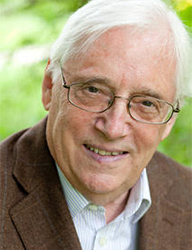 We announce with great honour and pleasure that Professor Sir John E. Walker, a Nobel Laureate, has joined our Foundation as a Special Scientific Advisor.
We announce with great honour and pleasure that Professor Sir John E. Walker, a Nobel Laureate, has joined our Foundation as a Special Scientific Advisor.
Professor Walker’s work on the complex molecular machine in the mitochondria, known as the ATP synthase, led to the realisation that the energy released by the oxidation of dietary sugars and fats is coupled by a mechanical rotary mechanism to generate the ATP that sustain human lives. This work led to the award of the Nobel Prize in Chemistry to him in 1997. In collaboration with F. Palmieri, he also identified the biochemical functions of fifteen members of the mitochondrial transport family, including the aspartate-glutamate transporter (citrin) whose genetic mutations cause citrin deficiency. Throughout his illustrious career, Professor Walker has tirelessly worked to use his scientific knowledge for medical benefits. We are extraordinarily lucky to have Professor Walker joining our Foundation.
Professor Walker received his undergraduate degree at St Catherine’s College, Oxford. In 1974 he joined the Laboratory of Molecular Biology of the Medical Research Council in Cambridge, where he helped to discover overlapping genes in bacteriophages, and established their presence in human mitochondrial DNA. In Cambridge, he developed his interest in how energy in food is transferred, in the mitochondria, into the molecule ATP (or adenosine triphosphate), the energy currency of life. In 1982, he defined the basic threefold repeated structural fold that defines the 53 members of the family of mitochondrial transport proteins in humans, amongst them the protein that transports ATP. He is the Emeritus Director and Professor at the MRC Mitochondrial Biology Unit in Cambridge. He is a Fellow of the Royal Society, and in 2012, he received its Copley Medal, the UK’s highest scientific accolade. He is also a Fellow of the Academy of Medical Sciences, and an Honorary Fellow of St Catherine’s College, Oxford. Attached please find a more detailed summary of his biography.
Professor Walker’s wealth of expertise and experience are highly relevant and critical to our Foundation’s work. His experience of building the MRC research unit in Cambridge from the beginning will also be very useful for us as we continue to expand our research efforts. We hope the addition of Professor Walker will bring us closer to thorough understanding of citrin deficiency and eventually curing it. We very much look forward to working with Professor Walker.
It has been less than three years since the Foundation was founded and we are very fortunate to have made so much progress. It would not have been possible without the support of many researchers, physicians, patients, and friends, like yourself. While we have come a long way, we know there is still a long way to go. We hope to have your continued and unwavering support in the journey ahead. We will keep you updated on our progress.
